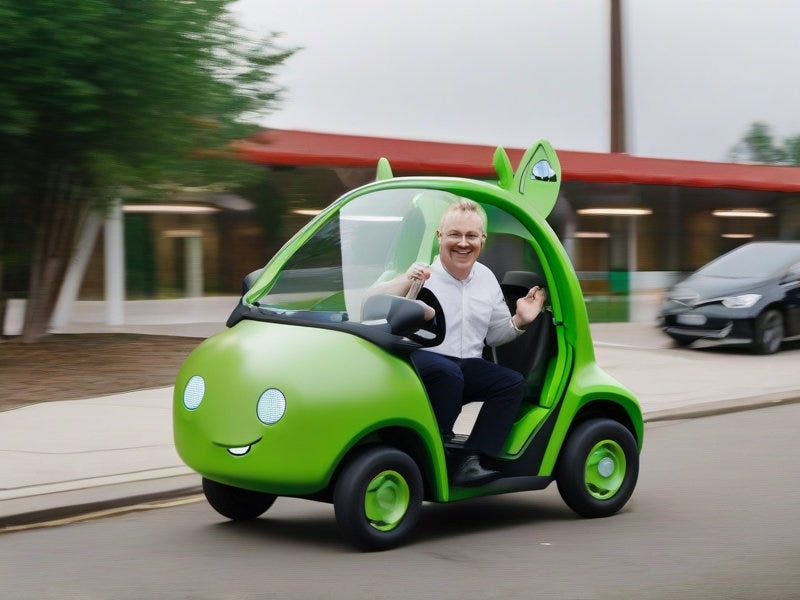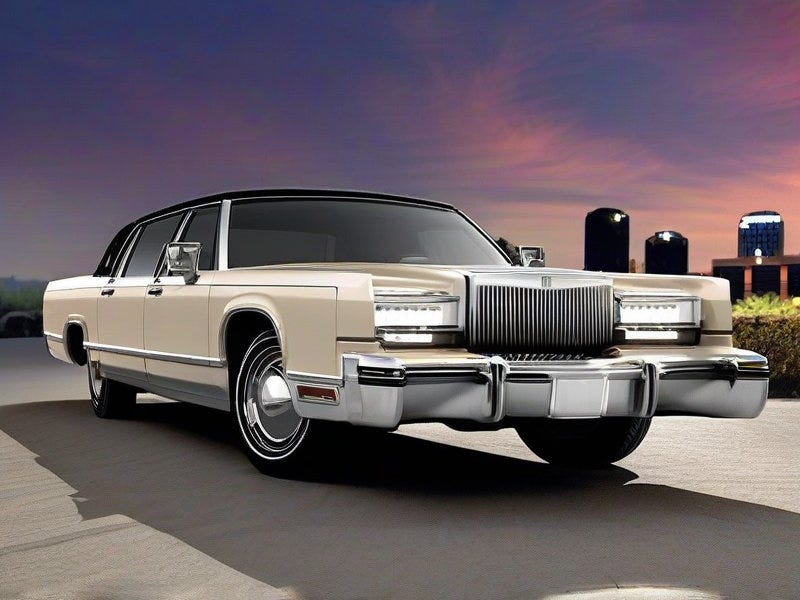Electric cars. They are quiet. They have huge crumple zones. They have a frunk. They have incredible acceleration. I understand why some people love them.
They are particularly lovable in California. Those coastal cities are surrounded by mountains which trap the smog. Winters are mild so battery powered cars remain efficient. I strongly suspect that much of the Left Coast obsession over global warming is really an excuse to outlaw gasoline and diesel engines. Quiet neighborhoods and clean air are nice.
So yes, if you are applying the Green RINO strategy, it behooves you to drive an electric car. Make it a Tesla. Remind the real environmentalists how quickly Team D turned against Tesla once Elon Musk bought Twitter.
On the other hand, if someone bought me a Tesla, I'd sell it as fast as possible. My own personal taste in automobiles runs more Black RINO.
I like big cars with big trunks and a steering wheel you have to spin in order to put your car into a spin. And I want my car's computer to be dumb or nonexistent. Internet connected cars with self driving capabilities terrify me.
If Californians want to encourage electric cars to desmogificate their cities, so be it. But try to mandate electric cars nation wide and you have made an enemy: me.
The Problems With Electric Cars
From an environmental and security standpoint electric cars are not nearly as nice as advertised. Today's batteries require strategic minerals, and the cobalt in current lithium batteries is particularly problematic. Compact motors require copper and rare earth magnets. If you want to see a really, really, really big hole in the ground, check out the Kennecott Copper Mine in Utah. Meanwhile, Chinese rare earth mining is dirty business. And currently, today's electric cars are mainly powered by natural gas from fracking and coal.
But those are not the fundamental problem with electric cars! The environmentalists' long term goal is to charge the cars with a carbon neutral source of electricity: solar, wind, geothermal, or nuclear. Research is ongoing for batteries which use more readily available materials. Sodium ion batteries are already on the market. Research is ongoing for extracting rare earth elements from coal ash and existing mine tailings. Perhaps with better connections, we can revisit aluminum for home wiring, or even use aluminum for electric motors.
No, the fundamental problem with electric cars is the huge amount of power required to charge the batteries in a reasonable amount of time. A gallon of gasoline has 120,000,000 Joules of energy! It takes around ten seconds to pump a gallon of gasoline into a conventional car. That's the equivalent of 12 MEGAWATTS! OK, I was being a bit unfair. Gasoline gives you that much energy in the form of heat, not electricity. The conversion of heat into mechanical energy is much less efficient, something like a factor of four on the highway. Let's call it a factor of six for city driving. That's still TWO MEGAWATTS!
And what happens when the power grid goes down? Depending entirely on electric cars is a fragile arrangement.
And what about drivers in cold climates? Gasoline engines aren't as efficient as batteries, but that inefficiency results in useful heat. Not freezing to death is useful.
For predictable commutes in warm climates charging electric cars may well be a viable option. And batteries might be the way to go for delivery vehicles, which make lots of stops; the regenerative braking saves a bunch of energy. But for going on a long trip, rechargeable batteries are inherently worse than liquid fuels.
The Case for Liquid Fuels
We think of gasoline as a dangerous substance because it is. But if we look at danger per unit of useful energy, gasoline comes out surprisingly well. You don't need a special degree in safety precautions to legally fill up a two gallon gas can to take home to run your lawn mower. That gas can holds something like a quarter million Joules of heat energy, or around 50 million Joules of mechanical energy for a low efficiency small engine. One kilowatt-hour is 3.6 million Joules, so that can is holding nearly 14 kilowatt-hours of useful energy. A supercapacitor with that much energy would be basically a bomb. Way back when I took undergrad physics, my professor charged up a coffee can sized capacitor with a low voltage power supply and then shorted out the battery with a screwdriver. It sounded like a small bomb going off. A battery pack capable of propelling a vehicle would be even more dramatic if shorted out. (The movie Demolition Man got this one right.) Liquid fuels are relatively safe because they are inert until mixed with air. That's why most states allow you to pump your own gasoline.
Ethanol is even safer than gasoline. It takes more heat to set it off, and since it mixes with water, you can put out an ethanol fire with water. Ethanol biodegrades readily, and the toxic dose is on the order of ounces. Unfortunately, it takes sugar to make ethanol, and plants want to combine most of their sugars into starches and cellulose. Developing a superbug to break up cellulose in order to make ethanol fuel is probably a Bad Idea.
Methanol is not as safe as ethanol, but it has long been deemed safe enough to use for indoor fires (Sterno) and mimeograph fluid. Methanol is used as an antifreeze for windshield washers. Methanol, like ethanol, biodegrades rapidly. Overall, I believe methanol would be a much safer fuel than gasoline. It is also a proven fuel. Indy cars were burning methanol back when I was a kid. Last time I visited California, there were methanol fuel pumps. Methanol can be made from natural gas. It can also be made from hydrogen and carbon dioxide. [See The Methanol Economy, by Olah, Goeppert, and Prakash.] In other words, we already have the technology to go from either solar or nuclear energy to a liquid fuel that can be burned in engines using 1970s technology.
Methanol is not as energy dense as gasoline, but it's WAY denser than hydrogen gas. So just make the fuel tank bigger. No biggie. Or actually, keep the same fuel tank and up the compression ratio. Methanol can be burned more efficiently than gasoline since it has a much higher octane rating. However, the efficiency of going from solar to hydrogen to methanol to internal combustion engine is going to considerably less efficient than going from solar to battery to electric motor. Exactly how much less efficient is something I need to do more research on; my chemistry knowledge is very rusty, so The Methanol Economy is a slow read for me. Even if the methanol cycle is ten times worse than batteries, we get several huge benefits:
Methanol can be economically transported from where the solar and wind energy is to where consumers are.
Methanol can be stored for months.
Methanol can be stored in mass quantities. No fragility.
Methanol could be burned in low tech automobiles made of steel and aluminum.
Methanol pumps can be nearly as fast as gas pumps in terms of useful energy per minute.
If I were emperor I'd decree that a corner of Nevada be covered with solar cells and carbon dioxide collectors to make methanol. (Or maybe just use thorium nuclear reactors.) Then, I'd tell the car companies that they can get a complete exemption from Corporate Average Fuel Economy standards for vehicles which burn methanol. Bring back big ass cars with rear wheel drive, comfy seats, and large trunk openings. Get rid of that overly aerodynamic bubble look. Make windshields vertical enough to see through in the rain. Make Town Cars boxy and intimidating enough for our stylish mafia dons. Make tail fins great again. And don't bother with 30 speed transmissions and evil robots that shift gears every 50 feet. Maybe we should go back to computer free engines with carburetors, something that can survive the electromagnetic pulse from a high altitude nuclear explosion or teenage space aliens.
Megalomania aside, the point I'm trying to make here is that we can defend a 50s lifestyle and still be greener than the Greens. Stop mandating over the top energy efficiency and focus on the viable alternatives.






I like your ideas, and I like your taste in automobiles. I'm more of a diesel man myself; my mechanical diesels will last forever. I suppose that doesn't make me very green, but old diesels can run on biofuels, so I guess there's some potential there.
I'm in. Can I make methanol at home?